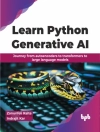ADVANCES IN FUZZY-BASED INTERNET OF MEDICAL THINGS (IOMT)
This book explores the latest trends, transitions, and advancements of the Internet of Medical Things whose integration through cloud-hosted software applications adds required intelligence from tools such as medical instruments, scanners, and appliances, enabling fuzzy logic to help medical professionals establish linguistic concepts in deciding diagnosis and prognosis.
The main goal of the book is to strengthen medical professionals and caregivers by providing methods for achieving fuzzy logic-based health diagnosis and medication. The health condition and various physical parameters of humans, such as heartbeat rate, sugar level, blood pressure, temperature, and oxygen quality, are captured through a host of multifaceted sensors. Additionally, remote health monitoring, medication, and management are being facilitated through a host of ingestible sensors, 5G communication, networked embedded systems, AI models running on cloud servers and edge devices, etc. Furthermore, chronic disease management is another vital domain getting increased attention. The distinct advancements in the fuzzy logic field are useful in various advanced medical care functionalities and facilities.
The readers will discover:
* new and innovative features of health care by using fuzzy logic that raises economic efficiency at macro and micro levels;
* expounds on fuzzy logic techniques used in medical science;
* describes the evolution of the fuzzy logic paradigm and how it helps physicians decide on diagnosis and prognosis;
* uncovers how trust management is dealt with between patients and medical officials to help advance the fuzzy logic field;
* provides case studies, various technology advancements, and practical aspects on the impacts and challenges of fuzzy-based Internet of Medical Things.
Audience
The book will be read and used by researchers in artificial intelligence, fuzzy logic, medical professionals, caregivers, health administrators, and policymakers.
Spis treści
Preface xv
1 Io MT–Applications, Benefits, and Future Challenges in the Healthcare Domain 1
E. M. N. Sharmila, K. Rama Krishna, G. N. R. Prasad, Byram Anand, Chetna Vaid Kwatra and Dhiraj Kapila
2 Fuzzy-Based Io MT System Design Challenges 25
Ramakrishna Kolikipogu, Shivaputra and Makarand Upadhyaya
3 Development and Implementation of a Fuzzy Logic-Based Framework for the Internet of Medical Things (Io MT) 39
Santosh Reddy P., Mamatha A., Akshatha Kamath, Sreelatha P. K., Santosh Y. N. and Pallavi C. V.
4 Detecting Healthcare Issues Using a Neuro-Fuzzy Classifier 59
D. Saravanan, R. Parthiban, G. Arunkumar, D. Suganthi, Revathi R. and U. Palani
5 Development of the Fuzzy Logic System for Monitoring of Patient Health 75
Norma Ramírez-Asís, Ursula Lezameta-Blas, Anil Kumar Bisht, G. Arunkumar, Jose Rodriguez-Kong and D. Saravanan
6 Management of Trust Between Patient and Io T Using Fuzzy Logic Theory 93
L. Rajeshkumar, J. Rachel Priya, Konatham Sumalatha, G. Arunkumar, D. Suganthi and D. Saravanan
7 Improving the Efficiency of Io MT Using Fuzzy Logic Methods 107
K. Kiran Kumar, S. Sivakumar, Pramoda Patro and Renu Vij
8 An Intelligent Io T-Based Healthcare System Using Fuzzy Neural Networks 121
Chamandeep Kaur, Mohammed Saleh Al Ansari, Vijay Kumar Dwivedi and D. Suganthi
9 An Enhanced Fuzzy Deep Learning (IFDL) Model for Pap-Smear Cell Image Classification 135
Rakesh S., Smrita Barua, D. Anitha Kumari and Naresh E.
10 Classification and Diagnosis of Heart Diseases Using Fuzzy Logic Based on Io T 149
Srinivas Kolli, Pramoda Patro, Rupak Sharma and Amit Sharma
11 Implementation of a Neuro-Fuzzy-Based Classifier for the Detection of Types 1 and 2 Diabetes 163
Chamandeep Kaur, Mohammed Saleh Al Ansari, Vijay Kumar Dwivedi and D. Suganthi
12 Io MT Type-2 Fuzzy Logic Implementation 179
Sasanko Sekhar Gantayat, K. M. Pimple and Pokkuluri Kiran Sree
13 Feature Extraction and Diagnosis of Heart Diseases Using Fuzzy-Based Io MT 195
Tribhangin Dichpally, Yatish Wutla, Vallabhaneni Uday and Rohith Sai Midigudla
14 An Intelligent Heartbeat Management System Utilizing Fuzzy Logic 211
K. Suresh Kumar, R. Sudha, T. Suguna and M. K. Dharani
15 Functional Fuzzy Logic and Algorithm for Medical Data Management Mechanism Monitoring 225
U. Moulali, Bhargavi Peddi Reddy, Srikanth Bhyrapuneni, Shruthi S.K., Shaik Khaleel Ahamed and Harikrishna Bommala
16 Using Io T to Evaluate the Effectiveness of Online Interactive Tools in Healthcare 239
K. Suresh Kumar, Chinmaya Kumar Nayak, Chamandeep Kaur and Ahmed Hesham Sedky
17 Integration of Edge Computing and Fuzzy Logic to Monitor Novel Coronavirus 255
K. Rama Krishna, R. Sudha, G. N. R. Prasad and Jithender Reddy Machana
18 Implementation of Io T in Healthcare Barriers and Future Challenges 271
Aravindan Srinivasan, Veeresh Rampur, Munagala Madhu Sudhan Rao and Ravinjit Singh
References 283
Index 287
O autorze
Satya Prakash Yadav is an associate professor at GL Bajaj Institute of Technology & Management in Uttar Pradesh, India. He completed a Ph D in science and technology from the Dr. A.P.J. Abdul Kalam Technical University, Lucknow, India. He has 17 years of education experience, 4 published books, and has two patents. Yadav is the chief editor of the Journal of Cyber Security in Computer Systems Science and Engineering.
Sudesh Yadav is an assistant professor at Government College in Haryana, India. She has a Ph D in computer science from Guru Gobind Singh Indraprastha University, Delhi, India. Her main areas of interest are artificial intelligence, digital image processing, and soft computing. Along with publishing research papers, Yadav has also reviewed research papers from international journals and conferences.
Pethura Raj is chief architect and vice president at Reliance Jio Platforms Ltd in Bangalore, India. He has a Ph D in computer science and automation from the Indian Institute of Science in Bangalore, India. His areas of interest focus on artificial intelligence, model optimization, and reliability engineering. He has published thirty research papers and edited forty-two books.
Victor Hugo C. de Albuquerque works in the Department of Teleinformatics Engineering at the Federal University of Ceara, Brazil. He has a Ph D in mechanical engineering from the Federal University of Paraiba. His research concentrates on applied computing, Intelligent systems, and artificial intelligence. He is Editor-in-Chief of the Journal of Artificial Intelligence and Systems.












